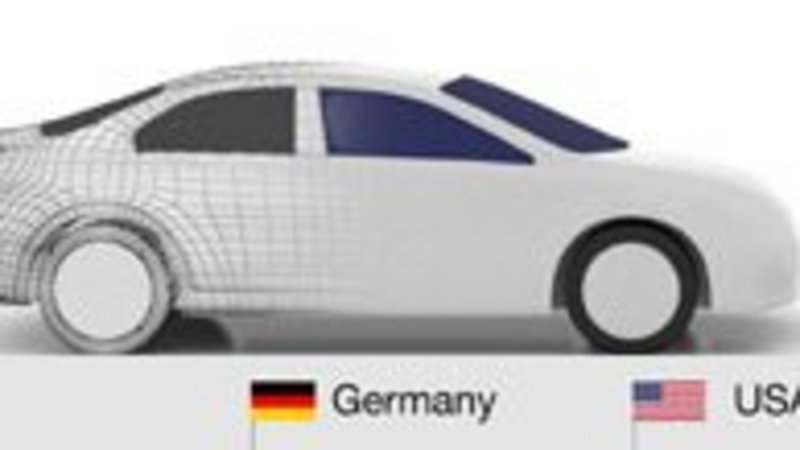Green Image: Electric Cars Take the Lead in Global Awareness
“Continental Mobility Study 2011”:
- Electric cars enjoy a very high level of awareness overall
- The majority of people have a high degree of confidence in the technology
- Safety concerns regarding short range and battery technology
- Technology not yet considered fully developed
Hanover, December 15, 2011. If you ask people to name a fuel-saving drive system, the vast majority of them will immediately say electric drives. This is followed in second place by hybrid systems. This is one of the key findings of the “Continental Mobility Study 2011”, carried out by the market and social research institute infas on behalf of the international automotive supplier. 4,000 vehicle users were surveyed in Germany, the USA, France and China.
Almost everyone in Germany is aware of the electric car (99%). This figure is also high in the US (92%) and in China (92%). The French appear less well informed, with an awareness level of just 67%. The profile of the hybrid drive shows a similar picture, with almost everyone aware of it in Germany (96%), and awareness levels of 91% in the US, 87% in China, and 68% in France.
Germany: Diesel and gas enjoy a greener image than the hybrid
Pure awareness, however, does not necessarily go hand in hand with knowledge of the technology behind it and its benefits in terms of protecting the environment and resources. This was the conclusion drawn from two further findings of the Continental Mobility Study:
- When asked to name a fuel-saving drive system, the majority of car drivers in all countries immediately said either electric cars or electricity: 61% in both Germany and China, 43% in France and 40% in the US. The hybrid drive system, however, which is already volume-produced by a number of automobile manufacturers, was nowhere near reaching these kinds of figures in Germany: It came in fourth place after diesel (57%) and gas (46%). In the US (40%) and France (43%), it was classed as being just as environmentally friendly or of a similar level of environmental friendliness as the electric drive system. In China, it took a clear second place with 44%.
- The Germans appeared the best-informed when asked about hybrid technology: The 96% that are aware of it can be broken down into 44% who know that it involves combining a diesel, gasoline or gas engine with an auxiliary electric motor, 13% who identify it as being a combination of two engines, and 7% who refer to it as an alternative drive system. 32% have no concept of the technology. The least informed generally appear to be the Chinese (level of awareness: 87% – diesel, gasoline or gas engine plus electric motor: 21%; combination of two engines: 14%; alternative drive system: 5%; no comment: 49%).
A high degree of confidence in electric cars, but…
Confidence in electric vehicle technology generally prevails. Just 9% of Germans, 22% of French, 28% of Chinese and 33% of Americans expressed safety concerns. The types of concerns vary greatly: While the main concern among the Chinese was battery defects (52%), 37% of French respondents cited the fire risk as their main worry, followed by fear of receiving an electric shock (28%). Electric shock was also the second most frequent safety concern among the Germans and Americans (22% and 18% respectively). However their main concern, at 45% and 24% respectively, was getting into a situation posing a traffic hazard on account of an empty battery.
“Continental is working tirelessly on the electrification of the powertrain, even though the conventional combustion engine will continue to dominate the market for many years to come. Be it industry, science or politics – everyone involved in this is going to have to work even more closely together in the future. Only by working together across the industry will we be able to tackle the challenges posed by electric mobility in the best interests of car drivers,” stated Continental Executive Board Chairman, Dr. Elmar Degenhart.
… many regard the technology as not yet fully developed
In interviews with young adults in Berlin, Los Angeles and Beijing as well as in the countrywide surveys, the Continental Mobility Study clearly shows that although many of them have already heard of electric cars, they regard alternative drive systems as technologies that are not yet fully developed.
- Concerns exist mainly due to the range, which is seen as too short, the lack of charging infrastructure, long charging times, purchase costs, the lack of sound (and the associated failure to be noticed by other road users), the development of electricity costs and environmental friendliness.
- Electric and hybrid drives received some plus points: Since they do not produce any direct emissions, it is more cost-efficient to drive on electricity than it is on gasoline and electric cars are “cooler” cars – the latter was a finding from Los Angeles.
Efficient batteries will increase acceptance
“The survey results confirm the direction we are taking – to develop batteries that are better value for money and more efficient. This will increase the acceptance of hybrid and electric cars considerably,” explained José A. Avila, Continental Executive Board Member and head of the Powertrain Division. Continental is one of the pioneers of hybrid and electric vehicle technology. The company has been developing components such as power electronics, electric machines and energy storage devices for hybrid and electric drives since back in the mid 1990s. It is also making a specific effort to press ahead with the development of high-voltage lithium-ion battery systems for electric vehicles – a cooperation with the Darmstadt-based engineering company Akasol was agreed for this very purpose just this year.



